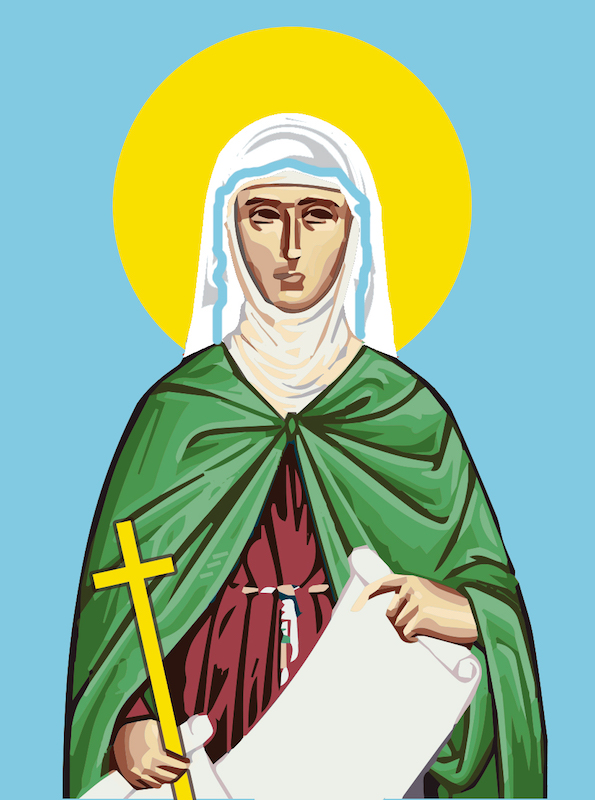Readings for the feast day of Marcella of Rome, January 30, 2020:
1 Kings 17:8–16
Psalm 124
Mark 12:41–44
Marcella of Rome is one of those figures from the earliest days of Christanity who was quickly recognized as a saint, but so much of what we know from her was lost to time (and possibly to misogyny) as Christianity grew and matured. Most of what we know about her comes from The Letters of St. Jerome, from the late 300’s. The choice of the Gospel reading for this feast day is appropriate (the widow’s mite) because Marcella chose to give up the life as the widow of a nobleman to adopt an ascetic lifestyle.
Marcella was born in 325 to a wealthy family, and the first part of her life was pretty typical of the life of Roman nobility of that era. She became an educated woman for the reason most Roman women were educated–to be a great accessory to a noble husband. Following the death of her father, she was “married off” at a young age–but her husband died after seven (some accounts say nine) months of marriage. Rather than quickly remarry, as was the custom, she revealed herself as a woman of spunk by rejecting the affections of Cerealis, an older man who was a Roman consul. Her spurned suitor pushed back with the argument that sometimes, old men live a long time, and sometimes young men die early; she quickly countered that “A young man may indeed die early, but an old man cannot live long.” Needless to say, this pretty much convinced other potential suitors that she wasn’t in the market for another husband! Her response was to give up sartorial finery, jewelry and makeup, and adopt a coarse brown garment as her daily habit.
Marcella took this even further by devoting her life to charity and prayer, pretty much spending the family fortune dry. She turned her palatial abode into a monastery of sorts, welcoming other noblewomen who wished to devote themselves to Christianity. As her reputation grew, one of her teachers (and, as it turned out, one of her biggest fans) was Jerome. This spunky woman was not afraid to push back at him when it came to theology and understanding the Scriptures. He wrote:
“As in those days my name was held in some renown as that of a student of the Scriptures, she never came to see me without asking me some questions about them, nor would she rest content at once, but on the contrary would dispute them; this, however, was not for the sake of argument, but to learn by questioning the answers to such objections might, as she saw, be raised. How much virtue and intellect, how much holiness and purity I found in her I am afraid to say, both lest I may exceed the bounds of men’s belief and lest I may increase your sorrow by reminding you of the blessings you have lost. This only will I say, that whatever I had gathered together by long study, and by constant meditation made part of my nature, she tasted, she learned and made her own.”
Certainly, in some ways Marcella was Jerome’s pupil–yet in other ways, they were clearly colleagues, in a world where men generally didn’t have female academic colleagues. It was not, however, a publicly acknowledged collegiality. Marcella knew enough about her disadvantageous position that, when male priests came to visit her and learn from her, she quickly stated that her teachings were not hers, they were Jerome’s–even if they WERE her teachings. Jerome never seemed to mind–after all, she was bright enough that he knew her teachings would only elevate his more–so the ruse continued right up to her death.
Marcella met an unfortunate end when the Visigoths invaded Rome in 410. The soldiers who attacked her home, in a scene eerily reminiscent of Truman Capote’s In Cold Blood, couldn’t believe she didn’t have money stashed around the house somewhere–so they savagely tortured and beat her, along with her friend Principia, to the point of death. Some soldiers took pity on the women and carried them to the church of St. Paul, where they both died.
Through the lens of Marcella’s life we are reminded that the inclusivity of any group of people who are “different”, at times, has tragic costs. We see this mirrored in the lives of women throughout history, through minority groups, and through the struggles of the LGBT community. So many commonalities overlap–in particular, the need to be recognized by at least a few of those who belong to the status quo, the subterfuge of the ruses that must be perpetuated to not garner unwanted attention, and, sadly, the risk of losing one’s life.
How might each of us be called to live out our Baptismal Covenant by reaching out to someone as an equal when society doesn’t back that up? How might we be called to choose to be different and accept the risks that it entails?
Photo: Marcella of Rome, as depicted on last year’s Lent Madness page. You might recall that she went head to head (and lost) against Paula of Rome.
Maria Evans splits her week between being a pathologist and laboratory director in Kirksville, MO, and gratefully serving in the Episcopal Diocese of Missouri , as the Interim Pastor at Christ Episcopal Church, Rolla, MO.

